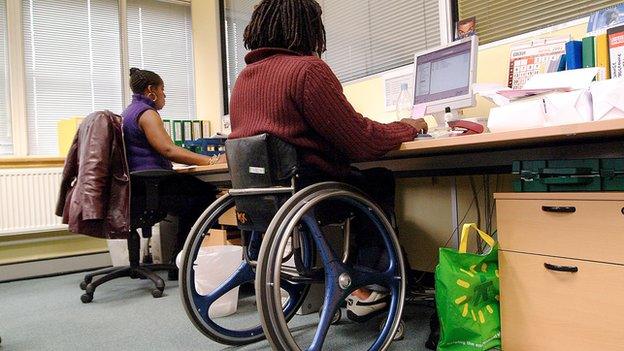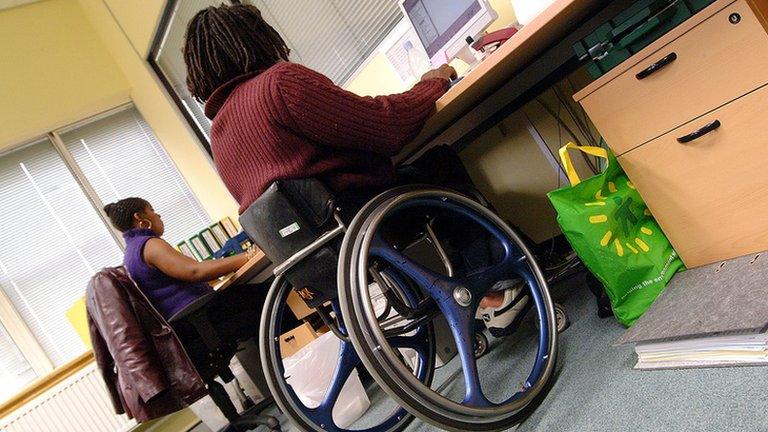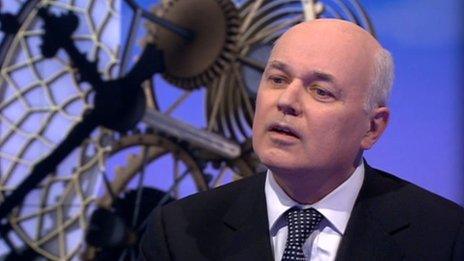Iain Duncan Smith defends welfare reforms
- Published

Iain Duncan Smith said reforms would mean people were regularly assessed to find out if they could work
The work and pensions secretary has defended changes to the welfare system, including disability benefit reforms.
Iain Duncan Smith said the raft of changes should save the taxpayer £50bn by the end of this Parliament.
He said the reforms - including tougher criteria for people seeking disability allowances - would "help and benefit" those who wanted to return to work.
The Disabilities Trust charity said the reforms were part of a "triple whammy" of factors hitting disabled people.
Speaking on BBC One's Andrew Marr Show, Mr Duncan Smith said: "I think the work programme is now for the first time ever working with people, who were once on sickness benefits and who are now not, going back to work."
'Higher levels'
He said the new regime would see disabled benefits claimants assessed on a regular basis to determine whether they need more support with their ailments or help to get work.
"There were over a million [people] not looked at for over 10 years," Mr Duncan Smith said.
"These regular reviews, I think, will help them and benefit them. We haven't introduced this to hurt or to harm disabled people. The purpose is to try to support disabled people."
He added: "The idea is to get people assessed so that we can find out those whose conditions have improved can then seek work, and many are going back to work now, and those who need full support get that full support."
Iain Duncan Smith : "I think most taxpayers... will want to know the money they pay goes definitely to those who need that support"
The government has been gradually rolling out the new Personal Independence Payment (Pip) to replace the Disability Living Allowance (DLA).
Under the old disability regime, claimants had to prove they could walk no further than 50m without support to receive the top end of the allowance.
Now, they will have to prove they can manage no more than 20m to benefit from the top payment.
Mr Duncan Smith insisted this was not a straight forward change, and that people would be assessed in two stages - on how much difficulty they have in reaching 20m first, and then 50m.
"What we're trying to do with these reforms is to get them to be fair so that the people who need them get better payments, and those who don't need the higher levels don't take the higher levels," Mr Duncan Smith said.
Under the DLA system, he said, 70% of people who made a claim got awards "for life".
The new regime will include regular face-to-face checks to establish the extent of claimants' ailments.
'Balanced and fair'
He said the Department for Work and Pensions (DWP) expects almost half of the £50bn in savings to come in the next 12 months.
The raft of welfare reforms, introduced a year ago, also included what the government calls the removal of the "spare room subsidy" but critics call the "bedroom tax".
Mr Duncan Smith, defending it, said it was not a tax but rather a "balanced and fair" policy for taxpayers.
However, Sarah Clifford, director of communications for the Disabilities Trust, said the reforms were part of a "triple whammy" of factors affecting disabled people.
She said the changes needed to be seen alongside cutbacks by local authorities and changes to housing benefit in England, Scotland and Wales.
The housing benefits changes - dubbed the "bedroom tax" by critics but described by ministers as the removal of a "spare room subsidy" - were introduced in April last year. A committee of MPs warned last week, external that the measures were creating "financial hardship and distress" for disabled people.
Ms Clifford said: "We just hope Mr Duncan Smith can deliver on the promise that this will be a fair system and will not be unfair or unjust on people with disabilities."
Meanwhile, the work and pensions secretary said the government had sought to end a contract with the firm Atos, which was tasked with assessing whether benefit claimants were fit to work.
Mr Duncan Smith denied reports it was Atos that had ended the arrangement, saying the taxpayer would pay nothing for the early break in the contract.
- Published27 March 2014

- Published10 March 2014

- Published29 January 2014
